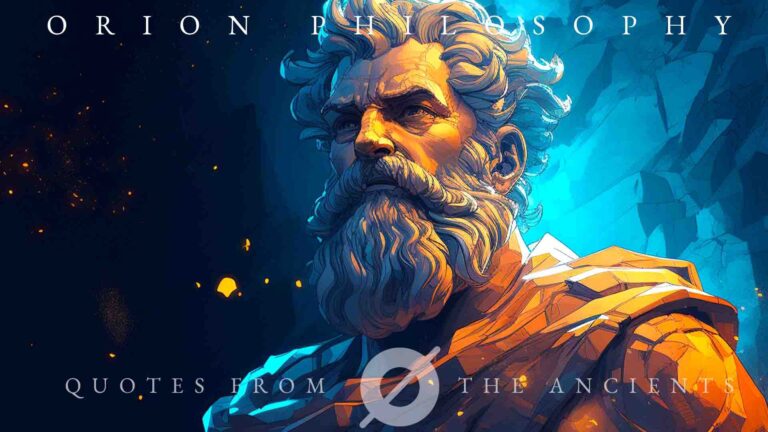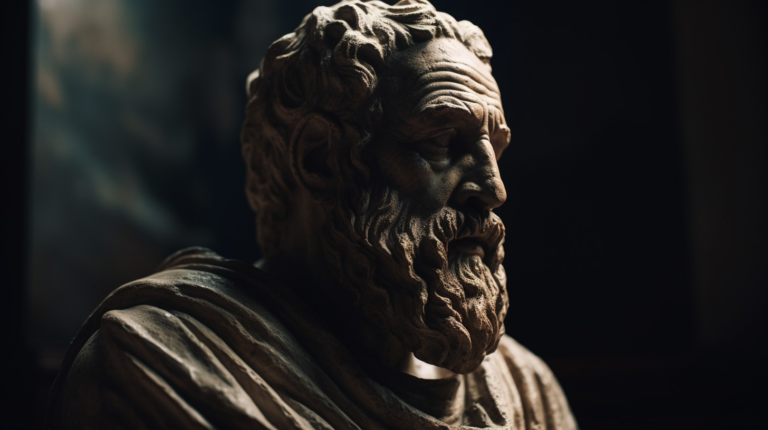What are the best Stoic books? Stoic philosophy is an excellent framework on which to build a resilient, stable, personal philosophy. It is as useful today in our ever changing, ever frantic world as it was over 2000 years ago during war, famine, disease, and political instability.
The very fact that Stoic philosophy is still practiced to this day pays tribute to the philosophy’s practicality and value. However, its age also means that many of the ancient texts have been lost to time.
Unfortunately, countless Stoic essays, books, lecture notes, and personal journals from the ancients have been lost. We can, however, be grateful for what has been left behind. The surviving Stoic books and essays provide a huge amount of value to those willing to leaf through their pages.
Here you will find our best books on Stoic philosophy:
-
Meditations – Marcus Aurelius
-
Discourses & Handbook – Epictetus
-
Letters From A Stoic – Seneca
-
The Daily Stoic – Ryan Holiday (Modern Book)
If you’re interested in Stoic philosophy, or simply want to develop a resilient, calm, composed, and content mindset, you can follow the link here to find the list of books.
Meditations By Marcus Aurelius:
“If you are distressed by anything external, the pain is not due to the thing itself, but to your estimate of it; and this you have the power to revoke at any moment.”
― Marcus Aurelius
Every now and then you pick up a book that completely changes the way you see the world. Meditations by Marcus Aurelius is one of those books.
Aurelius was the emperor of Rome during a long period of Germanic war and the Antonine plague. Despite the challenges of his reign, Aurelius is well known for being one of Rome’s greatest emperors. His army respected him, and his people loved him.
“Never let the future disturb you. You will meet it, if you have to, with the same weapons of reason which today arm you against the present.”
― Marcus Aurelius, Meditations
Meditations was his private journal. Aurelius found Stoic philosophy early in life, and the these Stoic roots shaped him into the man he was when he died. Towards the end of his life Aurelius began to write down his views on life, on people and his personal philosophy.
On every page of this Stoic book you will find something to think about, something you’ll have to read two or three times and allow to soak in. It’s probably the most frequently quotes works of Stoic philosophy, and for good reason.
Aurelius takes us through the corners of his mind, concerning compassion, personal responsibility, resilience, hardship, and humanity.
We’ve been left with one of the most significant Stoic texts that exists from the ancient world, and with it is a framework for a better life.
These days it’s simply called – Meditations.
It offers an incredible collection of introspective, challenging, honest and profound reflections. The work of a ageing Emperor doing what many of us try to do every day; figure out who we are and our place in the universe.
I can’t recommend it highly enough.
“You have power over your mind – not outside events. Realize this, and you will find strength.”
– Marcus Aurelius
Discourses & Handbook – Epictetus
For me, the go-to Stoic work is from Epictetus.
Epictetus was born a slave in ancient Greece, he was mistreated, crippled, and passed from master to master until he landed with a man that allowed him to study philosophy under the Stoic philosopher, Musonius Rufus.
Epictetus has the top spot for me because he is honest, direct, and unapologetic in his communication. Are you suffering? Life is hard, find out where you can leverage your power and do something about it.
The discourses of Epictetus were not written by the Stoic himself, but are a series of notes made by his student, Arrian. They offer you a trade. You can live a more peaceful, content and harmonious life, if you are willing to change your perception of the world around you, yourself and other people.
Epictetus is perhaps most known for his Dichotomy of Control:
Some things are within our power, while others are not. Within our power are opinion, motivation, desire, aversion, and, in a word, whatever is of our own doing; not within our power are our body, our property, reputation, office, and, in a word, whatever is not of our own doing.”
Epictetus provides multiple shifts in perspective to help you live at ease with the things around you. The Dichotomy of Control is one example
However, Epictetus doesn’t just point out the stark reality of life, he also offers frameworks to improve ourselves, to ascend our hardships and live happier, more resilient lives.
One of the reasons I love this book, and the work of Epictetus in general, is that he doesn’t simply tell the student comforting platitudes that they want to hear (like a lot of modern self help), he provides ideas that challenge us to be better.
Letters From A Stoic – Seneca
“If you really want to escape the things that harass you, what you’re needing is not to be in a different place but to be a different person.”
– Seneca
Seneca the Younger was a wealthy and influential statesman in ancient Rome. Counsellor to the Emperor Nero, he is widely considered to be one of the three core Stoic philosophers of the ancient world. Seneca is also given credit for making Stoic philosophy accessible to the masses, helping humanise the principles of Stoicism that can often come across cold or robotic.
Letters from a Stoic is an incredible collection of 124 lessons and Stoic teachings from Seneca to his friend Lucilius. Sharing the Stoic principle that if we focus on creating a strong character, we are able to accept whatever circumstances we find ourselves in and weather the storm.
“It is not the man who has too little that is poor, but the one who hankers after more.”
– Seneca
HOW this Stoic Book S CAN HELP US?:
Like many of the great Stoic teachers of the time, Seneca’s work really is an antidote to suffering.
He continued to write his letters up to his death in 65AD. Now, roughly 2000 year later, his teachings are still relevant, and provide a huge amount of wisdom and guidance for us, modern day folk, to navigate negative emotion, suffering, hardship, change, relationships and much, much more.
If you only have a handful of books on your shelf, this should be one of them.
ON GRATITUDE:
One of the running themes from Stoicism and Seneca’s work is Gratitude. Being content with the simple things you have, and not to dismiss them in the pursuit of more.
“Philosophy calls for simple living, not for doing penance, and the simple way of life need not be a crude one.”
– Seneca
Seneca softens the often harsh traditional views of Stoic Philosophy and teaches that we should make an effort to live in moderation, rather than some of the stricter Stoic practices of minimalist discomfort.
We should enjoy life, but not become slave to it’s pleasures. We should eat, but not to excess (the entire bar of chocolate is probably too much). We should drink, but not end up on the floor covered in our own sick. We should want a comfortable and reliable car, but question why we need a fresh, green Lamborghini.
The world today, as it did in Seneca’s time, promotes excess and outward displays of wealth. However, what value does it really add? The need to appear wealthy carries with it a lot of psychological baggage.
We constantly compare ourselves to others.
We’re always driven to get more rather than appreciate what we have, leading us to be dissatisfied with what we have.
The very fact that we want to appear wealthy means that we are looking for the approval of others.
All approval seeking behaviour means that our well-being and self worth is always in the hands of others, linked to what they think of us. This is not resilient.
Seneca instructs us to learn how to go without our luxuries, to break the relationship that links our happiness to our belongings. In today’s world this could be limiting social media for a month, or going camping for a week away from our phones and our computers.
When we go without, we quickly learn that we can live without.
ON CHARACTER:
Like many of his fellow Stoics, Seneca put a huge emphasis on the need for an individual to develop a healthy, resilient and moral character.
No matter what we have, how rich we are, or how wealthy we seem to other people, if we are unhappy with ourselves, we will be unhappy wherever we go.
However, if we’re successful in creating a solid character, we are then able to effectively navigate whatever circumstance life decides to throw at us:
-
We accept the situation for what it is
-
We know our capability and our limitations
-
We look to find the areas that we can control
-
We leverage our resources to adapt, solve and overcome
Seneca makes it clear that what we own can always be taken away, but who we are is ours to hold. Therefore the person whose life is focused on the growth of character will always be more resilient to the hardships of life than those who focus on material possessions.
The Daily Stoic – Ryan Holiday (Modern Book)
I wanted to add a modern book into the list, simply because there are a handful of great books that have promoted Stoicism to new generations.
The book, The Daily Stoic, stands out to me as one of the most valuable in recent years, simply because it has been so accessible for a wide range of different people.
The book itself is split into 365 days, and provides a structure for the reader to get a little Stoic insight every day of the year.
The simplicity is great. Every day you read a Stoic quote, and under the quote you are given a short explanation of the meaning.
I recommend this book to anyone interested in Stoic philosophy but doens’t want to wade through the heavy material from Greek and Roman translations.
If you want to join our community you can find us on Instagram, YouTube, or you can join our mailing list.






